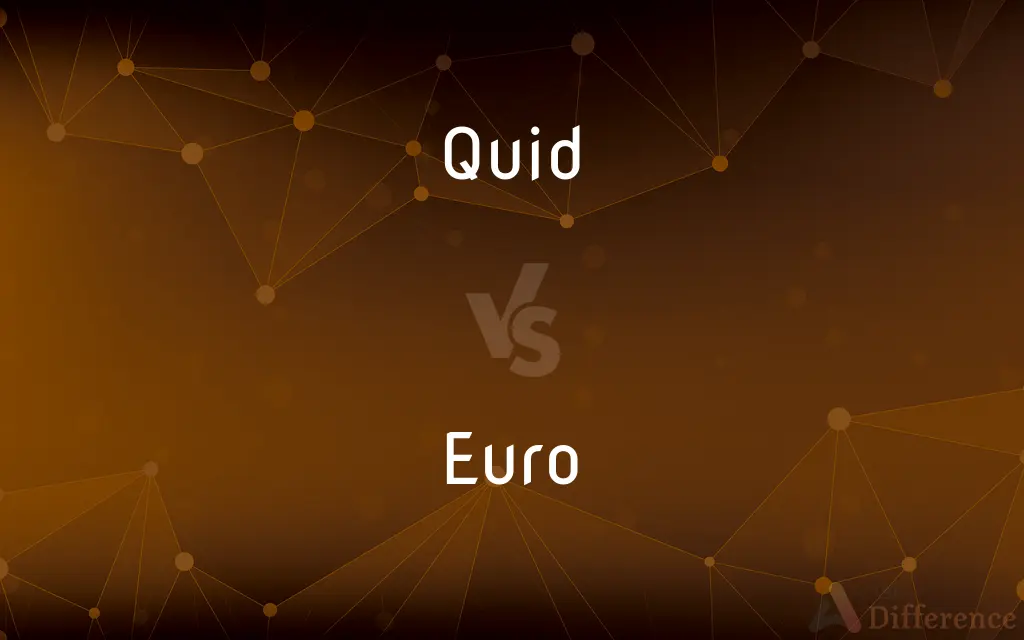Quid vs. Euro — What's the Difference?
By Tayyaba Rehman & Fiza Rafique — Updated on May 9, 2024
A quid is a colloquial term for the British pound, the currency of the United Kingdom, used informally; whereas the euro is the official currency of the Eurozone, utilized in multiple European countries.

Difference Between Quid and Euro
Table of Contents
ADVERTISEMENT
Key Differences
"Quid" refers informally to the British pound sterling, the official currency of the United Kingdom, which includes England, Scotland, Wales, and Northern Ireland. On the other hand, the euro is the official currency used by 19 of the 27 European Union countries, collectively known as the Eurozone.
The term "quid" is believed to have originated in the late 17th century, possibly from the Latin phrase "quid pro quo," meaning "something for something." Conversely, the euro was introduced in 1999 as a major step in European economic integration, with physical euro coins and banknotes entering circulation in 2002.
Quid, as a slang term, is used predominantly within the UK and carries no denominational value different from the pound itself. In contrast, the euro is subdivided into 100 cents, and its management and issuance are overseen by the European Central Bank and the Eurosystem.
The value of the quid (pound sterling) is influenced by the British economy and the policies of the Bank of England. Whereas, the value of the euro is impacted by the broader economic conditions of the Eurozone and decisions made by the European Central Bank.
In international finance, the pound sterling (quid) is one of the oldest currencies still in use and is considered a major currency for global trade and finance. The euro, on the other hand, is used by a larger population but is younger, yet it quickly became the second most traded currency in the world after the U.S. dollar.
ADVERTISEMENT
Comparison Chart
Official Status
Official currency of the United Kingdom
Official currency of the Eurozone
Introduction
Around 8th century
Introduced in 1999, notes and coins in 2002
Colloquial Usage
Informal term for the British pound
No widely used informal equivalents
Subdivision
1 pound = 100 pence
1 euro = 100 cents
Managed by
Bank of England
European Central Bank
Compare with Definitions
Quid
Known and used throughout the United Kingdom.
Can you lend me 20 quid?
Euro
The second most traded currency in the world.
The euro plays a major role in global markets.
Quid
One quid is equal to one British pound.
That souvenir cost me 15 quid.
Euro
Introduced for electronic transfers in 1999, physical form in 2002.
The euro has been in circulation for over two decades now.
Quid
Represents a currency with a long history.
The quid has been a staple of British commerce for centuries.
Euro
Used by 19 of the 27 EU countries.
France switched to the euro in 2002.
Quid
Informal term for the currency of the UK.
I spent fifty quid on that new jacket.
Euro
Each euro is divided into 100 cents.
The price was marked as 5 euros and 99 cents.
Quid
Physically identical to pound notes or coins.
He handed me a ten quid note.
Euro
Overseen by the European Central Bank.
The ECB sets monetary policy for euro-using countries.
Quid
A cut, as of chewing tobacco.
Euro
The euro (symbol: €; code: EUR) is the official currency of 19 of the 27 member states of the European Union. This group of states is known as the eurozone or euro area and includes about 343 million citizens as of 2019.
Quid
A pound sterling.
Euro
The currency unit of the European Monetary Union. Symbol: €
Quid
The inherent nature of something.
Euro
A coin with a face value of one euro.
Quid
A member of a section of the Democratic-Republican Party between 1805 and 1811, following John Randolph of Roanoke. (From tertium quid.)
Euro
Abbreviation of Europeanin any sense.
Euro size
Euro style pad
Quid
Paired with quo, in reference to the phrase this for that: something offered in exchange for something else.
Euro
Macropus robustus, a wallaroo (macropod species).
Quid
(historical) A sovereign or guinea, that is, a certain coin or amount of money.
Euro
The basic monetary unit of most members of the European Union (introduced in 1999); in 2002 twelve European nations (Germany, France, Belgium, Luxembourg, the Netherlands, Italy, Spain, Portugal, Ireland, Greece, Austria, Finland) adopted the euro as their basic unit of money and abandoned their traditional currencies
Quid
Pound sterling usually only used with a whole number of pounds
Seven quid for a toastie#English!toastie? You're joking aren't you?!
Quid
Various national currencies typically known by the name "pound"
Quid
Euro
Quid
Dollar, dollars
Quid
A piece of material for chewing, especially chewing tobacco.
Quid
The act of chewing such tobacco
Quid
To chew tobacco.
Quid
(of a horse) To let food drop from the mouth whilst chewing.
Quid
A portion suitable to be chewed; a cud; as, a quid of tobacco.
Quid
An English coin, a sovereign.
They invited him to come to-morrow, . . . and bring half a quid with him.
Quid
To drop from the mouth, as food when partially chewed; - said of horses.
Quid
The basic unit of money in Great Britain; equal to 100 pence
Quid
Something for something; that which a party receives (or is promised) in return for something he does or gives or promises
Quid
A wad of something chewable as tobacco
Common Curiosities
What is a quid equivalent to in currency?
A quid is an informal term equivalent to one British pound.
What is the significance of the term "quid"?
"Quid" is significant as a colloquial term that has been deeply ingrained in British culture and commerce.
What role does the European Central Bank play with the euro?
The European Central Bank manages the euro, sets monetary policy, and aims to maintain price stability in the Eurozone.
Why was the euro introduced?
The euro was introduced to facilitate easier trade and economic stability across its member countries.
What are the physical denominations of the euro?
Euros are issued in coins and banknotes of various denominations, from one cent to 500 euros.
Can you use quid in other countries?
While quid is specifically a term for the British pound, it's generally not used outside the UK.
How do the euro and quid differ in physical form?
The euro comes in both coins and banknotes with a variety of designs representing different European cultures, while quid, being a term for the pound, shares its physical characteristics.
How does the value of the quid compare to the euro?
The value of the quid (pound) and the euro fluctuates based on economic conditions, with exchange rates changing accordingly.
What are the security features of euro banknotes?
Euro banknotes include several security features such as watermarks, holograms, and microprinting to prevent counterfeiting.
Which countries use the euro?
The euro is used by 19 of the 27 European Union countries, including nations like Germany, France, and Italy.
Is quid used formally in financial transactions?
No, quid is an informal term; official contexts use "pound" or "GBP."
How is the value of the euro influenced?
The euro's value is influenced by economic performances across the Eurozone and ECB policies.
What historical significance does the pound have compared to the euro?
The pound sterling is one of the world's oldest currencies still in use, carrying a significant historical and economic legacy.
Can the euro be used outside the Eurozone?
Yes, the euro is also used and accepted in some countries outside the Eurozone due to its wide recognition and stability.
What is the future outlook for the euro and quid?
Both currencies are expected to remain key players in international finance, though subject to economic shifts and policy changes within their respective regions.
Share Your Discovery

Previous Comparison
Diversity vs. Biodiversity
Next Comparison
Capable vs. AbleAuthor Spotlight
Written by
Tayyaba RehmanTayyaba Rehman is a distinguished writer, currently serving as a primary contributor to askdifference.com. As a researcher in semantics and etymology, Tayyaba's passion for the complexity of languages and their distinctions has found a perfect home on the platform. Tayyaba delves into the intricacies of language, distinguishing between commonly confused words and phrases, thereby providing clarity for readers worldwide.
Co-written by
Fiza RafiqueFiza Rafique is a skilled content writer at AskDifference.com, where she meticulously refines and enhances written pieces. Drawing from her vast editorial expertise, Fiza ensures clarity, accuracy, and precision in every article. Passionate about language, she continually seeks to elevate the quality of content for readers worldwide.










































